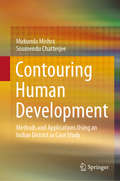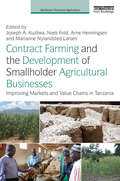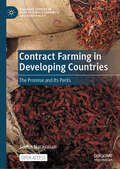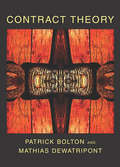- Table View
- List View
Continuous-Time Markov Chains and Applications: A Two-Time-Scale Approach (Stochastic Modelling and Applied Probability #37)
by Qing Zhang G. George YinThis book gives a systematic treatment of singularly perturbed systems that naturally arise in control and optimization, queueing networks, manufacturing systems, and financial engineering. It presents results on asymptotic expansions of solutions of Komogorov forward and backward equations, properties of functional occupation measures, exponential upper bounds, and functional limit results for Markov chains with weak and strong interactions. To bridge the gap between theory and applications, a large portion of the book is devoted to applications in controlled dynamic systems, production planning, and numerical methods for controlled Markovian systems with large-scale and complex structures in the real-world problems. This second edition has been updated throughout and includes two new chapters on asymptotic expansions of solutions for backward equations and hybrid LQG problems. The chapters on analytic and probabilistic properties of two-time-scale Markov chains have been almost completely rewritten and the notation has been streamlined and simplified. This book is written for applied mathematicians, engineers, operations researchers, and applied scientists. Selected material from the book can also be used for a one semester advanced graduate-level course in applied probability and stochastic processes.
Contouring Human Development: Methods and Applications Using an Indian District as Case Study
by Soumendu Chatterjee Mukunda MishraThis book acquaints readers with a range of techniques to help them effectively identify, record, map, analyze and report on patterns in various dimensions of human development (HD) with spatial scales down to the village level. It is impossible to capture HD at the local and global scale with only a single index, because differences in HD at the international scale are caused by ‘general’ factors, whereas local-scale differences are influenced by ‘specific’ factors. This book offers a variety of methods for scientifically mapping HD at any spatial scale. It covers how to rationally select variables; how to test the models; how to validate the results, and how to analyze them. For this purpose, it employs a case study on an Indian district. The socio-economic factors regulating the patterns of HD are now more complex than they were only a few decades ago, making it essential to incorporate newer models in order to successfully ‘replicate’ the real-world situation. Accordingly, the book offers essential methodological tools & techniques for mapping HD. It sheds new light on a handful of statistical multivariate analysis and machine learning algorithms that are rarely used in the social sciences when dealing with HD, yet have sound mathematical and statistical bases. These techniques can be successfully used for predictive analysis in the earth & natural sciences, decision sciences and management disciplines, and are equally effective in terms of capturing, predicting and projecting the composite HD ‘landscape.’ This book will especially benefit two groups of readers: firstly, HD practitioners who want to find out ‘why some areas are doing better than others’ by exploring the complex interactions of spatially linked variables with different HD parameters. And secondly, practitioners in other branches of the social sciences who are not concerned with HD but are looking for ‘hands-on training’ with techniques they can apply in their respective field of spatial investigations.
Contra Keynes and Cambridge: Essays, Correspondence (The Collected Works of F. A. Hayek #9)
by F. A. HayekIn 1931, when the young F. A. Hayek challenged the economic theories of John Maynard Keynes, sixteen years his senior, and one of the world's leading economists, he sparked a spirited debate that would influence economic policy in democratic countries for decades. Their extensive exchange lasted until Keynes's death in 1946, and is reprinted in its entirety in this latest volume of The Collected Works of F. A. Hayek. When the journal Economica published a review of Keynes's Treatise on Money by Hayek in 1931, Keynes's response consisted principlally of an attack on Hayek's own work on monetary theory, Prices and Production. Conducted almost entirely in economics journals, the battle that followed revealed two very different responses to a world in economic crisis. Keynes sought a revision of the liberal political order—arguing for greater government intervention in the hope of protecting against the painful fluctuations of the business cycle. Hayek instead warned that state involvement would cause irreparable damage to the economy. This volume begins with Hayek's 1963 reminiscence "The Economics of the 1930s as Seen from London," which has never been published before. The articles, letters, and reviews from journals published in the 1930s are followed by Hayek's later reflections on Keynes's work and influence. The Introduction by Bruce Caldwell puts the debate in context, providing detailed information about the economists in Keynes's circle at Cambridge, their role in the acceptance of his ideas, and the ways in which theory affected policy during the interwar period. Caldwell calls the debate between Hayek and Keynes "a battle for the minds of the rising generation of British-trained economists." There is no doubt that Keynes won the battle during his lifetime. Now, when many of Hayek's ideas have been vindicated by the collapse of collectivist economies and the revival of the free market around the world, this book clarifies Hayek's work on monetary theory—formed in heated opposition to Keynes—and illuminates his efforts to fight protectionism in an age of economic crisis. F. A. Hayek (1899-1992), recipient of the Medal of Freedom in 1991 and co-winner of the Nobel Memorial Prize in Economics in 1974, was a pioneer in monetary theory and the principal proponent of classical liberal thought in the twentieth century. He taught at the University of London, the University of Chicago, and the University of Freiburg.
Contra el futuro: Resistencia ciudadana frente al feudalismo climático
by Marta PeiranoTras advertirnos de los peligros de internet, vuelve Marta Peirano con un nuevo relato antiapocalíptico para construir un futuro esperanzador. Es la historia más vieja del mundo: la de un desastre medioambiental y una tecnología que nos salva. La hemos repetido como un mantra desde el principio de los tiempos porque hasta ahora se ha revelado cierta; somos el animal más peligroso de la sabana, hemos vencido a las bestias, a las tormentas y a la enfermedad. Pero la estrategia evolutiva que nos ha mantenido vivos desde el principio de la misma vida nos empuja ahora al borde de la extinción. Estamos tan atrapados que ya nos parece inevitable. No es un problema técnico. Hay soluciones a nuestro alcance para frenar el calentamiento global. Pero las grandes tecnologías de nuestro tiempo no pueden ayudarnos a gestionar la crisis climática, porque no están diseñadas para ello, sino para gestionarnos a nosotros durante la crisis climática. Este libro habla de las estrategias de acción ciudadana para hacer frente a la aceleración del feudalismo climático y el capitalismo desastre. Un nuevo relato antiapocalíptico para construir un futuro esperanzador. La crítica ha dicho:«Una de las raras periodistas que realmente se ha especializado en la intersección de la tecnología y el poder».Edward Snowden «Marta Peirano es una de las voces más respetadas en nuestro país sobre privacidad y seguridad en internet».Manuel Ángel Méndez, El Confidencial «Marta Peirano es una incitadora a la resistencia ciudadana. Es la única periodista que analiza la relación entre la Tecnología y el Poder».Mamen Mendizábal
Contraband
by Michael KwassLouis Mandrin led a gang of bandits who brazenly smuggled contraband into eighteenth-century France. Michael Kwass brings new life to the legend of this Gallic Robin Hood and the thriving underworld he helped to create. Decades before the storming of the Bastille, surging world trade excited a revolution in consumption that transformed the French kingdom. Contraband exposes the dark side of this early phase of globalization, revealing hidden connections between illicit commerce, criminality, and popular revolt. France's economic system was tailor-made for an enterprising outlaw like Mandrin. As French subjects began to crave colonial products, Louis XIV lined the royal coffers by imposing a state monopoly on tobacco from America and an embargo on brilliantly colored calico cloth from India. Vigorous black markets arose through which traffickers fed these exotic goods to eager French consumers. Flouting the law with unparalleled panache, Mandrin captured widespread public attention to become a symbol of a defiant underground. This furtive economy generated violent clashes between gangs of smugglers and customs agents in the borderlands. Eventually, Mandrin was captured by French troops and put to death in a brutal public execution intended to demonstrate the king's absolute authority. But the spectacle only cemented Mandrin's status as a rebel folk hero in an age of mounting discontent. Amid cycles of underground rebellion and agonizing penal repression, the memory of Mandrin inspired ordinary subjects and Enlightenment philosophers alike to challenge royal power and forge a movement for radical political change.
Contraband: Smuggling and the Birth of the American Century
by Andrew Wender CohenHow skirting the law once defined America’s relation to the world. In the frigid winter of 1875, Charles L. Lawrence made international headlines when he was arrested for smuggling silk worth $60 million into the United States. An intimate of Boss Tweed, gloriously dubbed “The Prince of Smugglers,” and the head of a network spanning four continents and lasting half a decade, Lawrence scandalized a nation whose founders themselves had once dabbled in contraband. Since the Revolution itself, smuggling had tested the patriotism of the American people. Distrusting foreign goods, Congress instituted high tariffs on most imports. Protecting the nation was the custom house, which waged a “war on smuggling,” inspecting every traveler for illicitly imported silk, opium, tobacco, sugar, diamonds, and art. The Civil War’s blockade of the Confederacy heightened the obsession with contraband, but smuggling entered its prime during the Gilded Age, when characters like assassin Louis Bieral, economist “The Parsee Merchant,” Congressman Ben Butler, and actress Rose Eytinge tempted consumers with illicit foreign luxuries. Only as the United States became a global power with World War I did smuggling lose its scurvy romance. Meticulously researched, Contraband explores the history of smuggling to illuminate the broader history of the United States, its power, its politics, and its culture.
Contract Analysis and Design for Supply Chains with Stochastic Demand (International Series in Operations Research & Management Science #234)
by Shouyang Wang T. C. Edwin Cheng Yingxue Zhao Xiaoge MengThis book is devoted to analysis and design of supply chain contracts with stochastic demand. Given the extensive utilization of contracts in supply chains, the issues concerning contract analysis and design are extremely important for supply chain management (SCM), and substantial research has been developed to address those issues over the past years. Despite the abundance of classical research, new research needs to be conducted in response to new issues emerging with the recent changing business environments, such as the fast-shortening life cycle of product and the increasing globalization of supply chains. This book addresses these issues, with the intention to present new research on how to apply contracts to improve SCM. Contract Analysis and Design for Supply Chains with Stochastic Demand contains eight chapters and each chapter is summarized as follows: Chapter 1 provides a comprehensive review of the classical development of supply chain contracts. Chapter 2 examines the effects of demand uncertainty on the applicability of buyback contracts. Chapter 3 conducts a mean-risk analysis for wholesale price contracts, taking into account contracting value risk and risk preferences. Chapter 4 studies the optimization of product service system by franchise fee contracts in the service-oriented manufacturing supply chain with demand information asymmetry. Chapter 5 develops a bidirectional option contract model and explores the optimal contracting decisions and supply chain coordination issue with the bidirectional option. Chapter 6 addresses supply chain options pricing issue and a value-based pricing scheme is developed for the supply chain options. With a cooperative game theory approach, Chapter 7 explores the issues concerning supply chain contract selection/implementation with the option contract under consideration. Chapter 8 concludes the book and suggests worthy directions for future research.
Contract Drafting
by Paul A. SwegleContract Drafting and Negotiation for Entrepreneurs and Business Professionals
Contract Farming and Land Tenancy in Indian Agriculture
by Parmod Kumar A.V. Manjunatha Suman K. SouravContract Farming and Land Tenancy in Indian Agriculture explores key determinants that drive contractual/lease relationships through the examples of various existing arrangements in the country. It is based on the premise that contract farming or leasing can be an attractive option to policy makers keen on integrating the poor into the industrialized sector of the economy by helping them access the gains from trade that characterize successful agricultural tenancy arrangements. Agricultural diversification can be promoted through a favourable environment of policy support in the area of contract farming and by reforming land policies that will enhance the bargaining power of small holders. The book systematically analyses contract farming in the broader framework of existing land and lease market system. It contains cross-sectional assessment with field insights from various states. The book will help to formulate a strong policy in favour of stakeholders involved in contract farming and land tenancy in India.
Contract Farming and the Development of Smallholder Agricultural Businesses: Improving markets and value chains in Tanzania (Earthscan Food and Agriculture)
by Joseph A. Kuzilwa Fold Niels Henningsen Arne Marianne Nylandsted LarsenContract farming has received renewed attention recently as developing economies try to grapple with how to transform the agricultural sector and its associated value chains. This book examines different contract arrangements for selected crops, applying both qualitative and quantitative approaches in order to examine how contract farming affects smallholders and value chain dynamics in Tanzania. Major themes covered in the book include: contract farming policy; contract farming and value chain dynamics; contract farming adoption decisions; contract farming and income diversification. The authors also discuss alternative aspects of contract farming such as trust, conspiracy, empowerment and corporate social responsibility. The book presents original research from case studies conducted in Tanzania on sugarcane, tobacco, sunflower and cotton. These crops have a history of trials and errors with contract farming involving smallholders. Furthermore, they are targeted in national strategies as some of the main crops for establishment and upgrading of agro-industrial activities in Tanzania.
Contract Farming in Developing Countries: The Promise and Its Perils (Palgrave Studies in Agricultural Economics and Food Policy)
by Sudha NarayananContract farming is an institutional arrangement between farmers and businesses to produce and transact agricultural commodities at predetermined prices and conditions, and it has recently received a heightened amount of attention despite being a relatively old phenomenon. A new wave of agricultural industrialization and the emergence of large-scale food retailing in developing countries may be precipitating the unprecedented shift in favor of contract farming. This open access book identifies the methodological differences across disciplines that have generated a false binary in discussions of contract farming. The author explains the importance of adopting a more integrated theoretical perspective, providing insights into the ways in which this can reconcile conflicting positions. Given the immense diversity of contracting schemes, commodities and contexts—as well as the substantial regional differences in contract farming experiences across a range of outcomes—a syncretic understanding of contract farming is essential to the evaluation of the promise and perils of contract farming. The resulting book proposes a way forward that is holistic in nature, framing contract farming within a comparative institutional analysis so that it can better accommodate multidisciplinary priorities.
Contract Farming, Capital and State: Corporatisation of Indian Agriculture
by Ritika ShrimaliThe book argues that an increasing corporatisation of agriculture in India that is enabled by its neoliberal State, in the name of ‘development’, is contributing towards deepening of inequality in the rural India.It says that Contract Farming (CF) acts as a conduit that enables the coming together of myriad production relations (mercantile, finance, productive) to sell agri-commodities to the capitalist peasant. It is an accumulation strategy that brings together various factions of domestic and foreign capital together. It shows that CF as an accumulation strategy is enabled by an active interventionist state and this neoliberal Indian state mediates the relation between the agri-capital and Indian peasantry. The book further analyzes contract farming as a part of the totality of the capitalist mode of production in context of developing countries with a large agrarian base--- asking three fundamental questions – what is CF, how and why is it done and what are the implications of it.
Contract Law Minimalism
by Jonathan MorganCommercial contract law is in every sense optional given the choice between legal systems and law and arbitration. Its 'doctrines' are in fact virtually all default rules. Contract Law Minimalism advances the thesis that commercial parties prefer a minimalist law that sets out to enforce what they have decided - but does nothing else. The limited capacity of the legal process is the key to this 'minimalist' stance. This book considers evidence that such minimalism is indeed what commercial parties choose to govern their transactions. It critically engages with alternative schools of thought, that call for active regulation of contracts to promote either economic efficiency or the trust and co-operation necessary for 'relational contracting'. The book also necessarily argues against the view that private law should be understood non-instrumentally (whether through promissory morality, corrective justice, taxonomic rationality, or otherwise). It sketches a restatement of English contract law in line with the thesis.
Contract Law and Social Morality
by Peter M. GerhartWhen people in a relationship disagree about their obligations to each other, they need to rely on a method of reasoning that allows the relationship to flourish while advancing each person's private projects. This book presents a method of reasoning that reflects how people reason through disagreements and how courts create doctrine by reasoning about the obligations arising from the relationship. Built on the ideal of the other-regarding person, Contract Law and Social Morality displays a method of reasoning that allows one person to integrate their personal interests with the interests of another, determining how divergent interests can be balanced against each other. Called values-balancing reasoning, this methodology makes transparent the values at stake in a disagreement, and provides a neutral and objective way to identify and evaluate the trade-offs that are required if the relationship is to be sustained or terminated justly.
Contract Law in Changing Times: Asian Perspectives on Pacta Sunt Servanda (Markets and the Law)
by Normann WitzlebThis collection of essays provides a rich and contemporary discussion of the principle of pacta sunt servanda. This principle, which requires that valid agreements are to be honoured, is a cornerstone of contract law. Focusing on contributions from Asia, this book shows that, despite its natural and universal appeal, the pacta sunt servanda principle is neither absolute nor immutable. Exceptions to the binding force of contract must be available in limited circumstances to avoid hardship and unfairness. This book offers readers new comparative perspectives on the appropriate balance between contractual certainty and flexibility in an era of social instability. Expert authors, mostly from East and Southeast Asia, explore when their domestic legal systems allow exceptions from the binding force of contracts. Doctrines discussed include impossibility, frustration, change of circumstance, force majeure, illegality as well as rights of withdrawal. Other chapters consider the importance of the pacta principle in international law. The challenges posed by the COVID-19 pandemic feature strongly in the majority of contributions.
Contract Management: Contractual Performance, Renegotiation, and Claims: How to Safeguard and Increase Profit Margins (Law for Professionals)
by Alain Brunet Franck CésarThis book presents the latest findings relating to behavioral economics and the digital tools applied to contract management. There has been a decisive change in the role of contracts in the past decade, with contracts being transformed from purely legal necessities designed to protect against worst-case scenarios into tools for optimizing ongoing and mutually profitable business relationships with customers. There is an increasing emphasis on tight contracts, where time-risk and additional costs are passed on to the prime contractor, who may suffer heavy penalties in the event of non-performance. Contracts shape the behavior of the parties involved and as such have a major impact on project success. The contract manager’s goals are to protect the interests of the company and its shareholders by minimizing the company’s financial and contractual liabilities and to maximize its profitability while ensuring end-user satisfaction. The contract is usually written before the design is fully developed, and there is often a mismatch between contractual specifications and what the customer actually wants. Good contract management entails preserving the rights of the contractor by ensuring all parties respect their contractual obligations; providing advice to the project managers and engineering team; preparing profitable amendments to contracts or change requests; maintaining good record-keeping in the event that claims arise; filing notices when necessary; and guiding the project to a profitable conclusion. Like the ancient Chinese game of Go, moves made early in the game (notification of events) can shape the nature of a potential conflict one hundred moves later (arbitration threat). Contract management can also smooth the relationship between partners, allowing well-balanced “don’t-trade-a-dollar-for-a-penny” contracts to be managed through an established process rather than as sporadic events (we cannot claim to be in control of our business if we are not in control of the contracts on which it depends). Managing a contract with a mix of incomplete manuals, fragmented information, and poor planning can drive companies to “reinvent the wheel.” Contract management promotes a three-phase sequence to streamline information flows across the contract lifecycle, from the bid phase to performance, project closeout, and final payments.
Contract Management: Core Business Competence
by Peter SammonsContract management is a key management skill, yet it is underplayed in most organizations, which usually default to project management skills as a proxy for contract management skills. Whilst project management skills are equally essential, they are not the same thing. Contract Management looks at the wider contract management picture from an industrial-commercial perspective, and helps set-out typical structures and processes that assist the contract management task. The author uses diagramatic representations to depict complex ideas. Contract Management includes "learning points" in each chapter, looking at handling problems, procedural changes and enhancing commercial performance.
Contract Options for Buyers and Sellers of Talent in Professional Sports (Palgrave Pivots in Sports Economics)
by Duane W Rockerbie Stephen T. EastonThis Palgrave Pivot re-examines salary formation in Major League Baseball in light of real option theory to clarify the connection between salary and marginal revenue product for professional baseball players. Current literature has tended to treat single-year and multi-year contracts similarly, ignoring the potential option value for teams and for players. Recent work points to the observation that both high-productivity and low-productivity athletes have salaries that systematically differ from their marginal revenue product, and that free agents signing multi-year contracts are overpaid relative to free agents signing one-year contracts. This book argues that the value of signing an athlete to a contract should be determined similarly to the determination of the value of an investment project or a financial asset. This book demonstrates how to calculate the value of real options to the player and the team owner with a simple two-year contract, and offers extensions to the real options model for multiyear contracts or when a player is early or late in his career.
Contract Practice for Surveyors
by Simon Birchall J W RamusThis book provides a detailed guide to the principles and practice of construction contracts. It is written for both students and professionals working in all branches of surveying and construction. Based around the JCT 05 Standard Building Contracts, it has been fully revised and updated to reflect the latest versions of these contracts. The book sets out clearly what should be done at each stage of the construction contract process. Each step is illustrated with examples of good practice making clear the role and responsibilities of the surveyor and how responsibilities are best delivered. This fourth edition of Contract Practice for Surveyors builds on the book's reputation for clarity and simplicity to provide the most accessible and useful introductory guide to construction contracts available today.
Contract Strategies for Major Projects: Mastering the Most Difficult Element of Project Management
by Edward W. MerrowMajor Projects are Delayed by Months or Years, and Cost Millions More Than Budgeted, Because of Common Mistakes Made at the Contracting StageOrganizations that invest huge amounts of capital in major building/industrial projects almost never do the engineering and building themselves. They hire engineering and construction contractors to do it for them. Unfortunately, selecting contractors and negotiating the terms of a major project is one of the most difficult aspects of project management...and organizations waste billions of dollars and "bake in" months or years of delay by doing it wrong. Contracting is also the area of project management that is most prone to firmly held opinions unencumbered by any facts. We intend to remedy that situation with this book. Drawing on a properietary detailed database of over 1100 major projects, the world's leading industrial engineering project consultant, Ed Merrow explains: Key Principles of Contracting for Major Projects: Owners are from Mars; contractors are from Venus All the biggest risks in contracting belong to the owner Contracting &“games&” will normally be won by contractors, not owners Most risk transfer from owners to contractors is an illusion Contractors do good projects well and bad projects poorly Contractors may have shareholders, but they are not your shareholders! Mixing different contract types with different contractors on the same project is unwise Economize on the need for trust; trust only when being trustworthy has value Merrow also explains: Which contract incentives work and which don&’t and WHY Which of over a dozen contracting strategies work best and which ones hardly ever work and WHY The strategic advice in this book is designed for owners and contractor project managers, team members and supply chain, executives, and other business leaders involved in major projects. It's also an indispensable resource for engineers, leaders of industrial firms, bankers, and academics studying the messy realities of the construction and engineering industries.
Contract Termination in International and Domestic Trade: Buyers’ Rights Under Contract Law
by Bashayer Al-MukhaizeemThis book highlights the right to terminate a contract, yielding invaluable insights to enable policymakers and legal practitioners to facilitate international trade.In the modern landscape of globalised trade, the imperative of a harmonised legal framework of contract law capable of fostering stability and trust in cross-border trade has never been more pronounced. This is represented in the United Nations Convention on Contracts for the International Sale of Goods (CISG), providing rules that can be known, understood and abided by globally. This book focuses on the termination of contracts, one of the harshest remedies when a sale of goods contract is breached by the seller. Breaches by the seller dealt in this book are confined to breaches of contractual description, delivery time and quality of goods, which are the most common violations of sale of goods contracts. This book scrutinises the methods adopted for challenging or facilitating contractual termination by CISG as a transnational law, as well as the Sale of Goods Act 1979 (SGA) and Kuwaiti law (KLaw), both of which are national laws of non-contracting states of CISG. This study also draws attention to lacunae and practical issues, focusing on critical analyses of law and cases, and recognises the adopted themes underlying each law to find the degree of their legal clarity and the threshold upon which termination can be granted. This comprehensive analysis also provides inspiration for beneficial changes by weighing the pros and cons of each system.The book will be of interest to practitioners, students, and scholars in the fields of contract law, trade law, commercial law and international law.
Contract Terms in International Business: Principles and Applications
by Akhileshwar PathakThis book comprehensively explains the meaning, scope, and applications of all important clauses in business contracts. The clauses include, among others, integration, no oral modification, termination, damages and indemnity clauses. The book engages the reader with its innovative approach that the clauses are founded on common sense principles of contract law. It draws from the English court judgments, mostly the United Kingdom Supreme Court and the Court of Appeal, which have been at the forefront in expeditiously interpreting the contract terms. As the same clauses are being used everywhere, the book is relevant in all the jurisdictions. The contract terms are being borrowed, adopted and adapted globally and the courts are interpreting the meaning and scope of the terms. Business managers, business leaders, government officers and policy makers, world over, work with domestic and international contracts and will find take-aways from the book. Students of business management and business studies can use it as a textbook for elective courses in business management on negotiating and managing business contracts. It can also be used as a textbook for executive education of business managers and government officers.
Contract Theory
by Mathias Dewatripont Patrick BoltonA comprehensive introduction to contract theory, emphasizing common themes and methodologies as well as applications in key areas. Despite the vast research literature on topics relating to contract theory, only a few of the field's core ideas are covered in microeconomics textbooks. This long-awaited book fills the need for a comprehensive textbook on contract theory suitable for use at the graduate and advanced undergraduate levels. It covers the areas of agency theory, information economics, and organization theory, highlighting common themes and methodologies and presenting the main ideas in an accessible way. It also presents many applications in all areas of economics, especially labor economics, industrial organization, and corporate finance. The book emphasizes applications rather than general theorems while providing self-contained, intuitive treatment of the simple models analyzed. In this way, it can also serve as a reference for researchers interested in building contract-theoretic models in applied contexts.The book covers all the major topics in contract theory taught in most graduate courses. It begins by discussing such basic ideas in incentive and information theory as screening, signaling, and moral hazard. Subsequent sections treat multilateral contracting with private information or hidden actions, covering auction theory, bilateral trade under private information, and the theory of the internal organization of firms; long-term contracts with private information or hidden actions; and incomplete contracts, the theory of ownership and control, and contracting with externalities. Each chapter ends with a guide to the relevant literature. Exercises appear in a separate chapter at the end of the book.
Contract Theory: Discrete- and Continuous-Time Models
by Jaeyoung SungThis book provides a self-contained introduction to discrete-time and continuous-time models in contracting theory to advanced undergraduate and graduate students in economics and finance and researchers focusing on closed-form solutions and their economic implications. Discrete-time models are introduced to highlight important elements in both economics and mathematics of contracting problems and to serve as a bridge for continuous-time models and their applications. The book serves as a bridge between the currently two almost separate strands of textbooks on discrete- and continuous-time contracting models This book is written in a manner that makes complex mathematical concepts more accessible to economists. However, it would also be an invaluable tool for applied mathematicians who are looking to learn about possible economic applications of various control methods.
Contract for the International Carriage of Goods by Road (Law for Professionals)
by Chiara TincaniThis book discusses the intensification of international transport services as the consequence of an increasingly capillary economic integration. In particular, in some European countries, such as Belgium, the Rhine area of Germany, and Denmark, the application of the Geneva Convention on the carriage of goods from the case law point of view is even more thorough than that of national law. Even though this is not the case for all countries, the Geneva Convention is a core text both for the scientific debates on the issue and for commercial operators. Therefore, proposing an up-to-date reading of the Convention is of utmost importance from the practical point of view, especially considering that, thanks to the consistent application of the International Carriage of Goods by Road contract, the Convention has become an essential prerequisite for the development of traffic.In ten chapters, this book reviews the Convention’s structure and considers the case-law approaches and trends of most countries belonging to the European Union. It covers contracts and different negotiating models as well as compensation, liability of the carrier, and damages.























